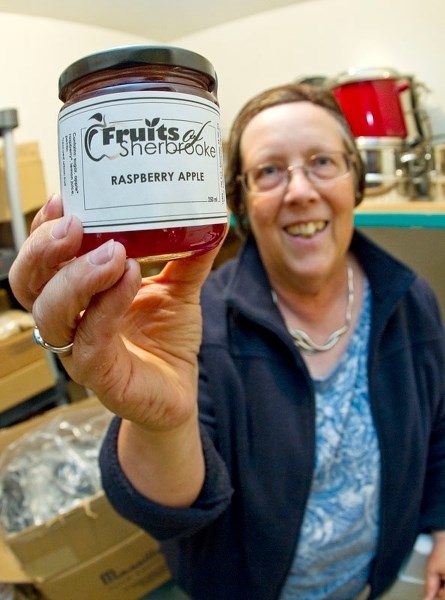Another growing season is swiftly coming to a close with backyard apples and other fruits dropping one by one to the soft earth below.
Not wanting to waste one bit of otherwise healthy and delicious food, one Edmonton not-for-profit organization is working hard to save as much of the bounty as it can.
Fruits of Sherbrooke bills itself as an urban fruit rescue group but it could easily also be described as suburban, now that local pickers have been in action in this city. It’s named after the Sherbrooke area (bordered by St. Albert Trail) where it is headquartered. According to its director, it’s a beautiful area with a lot of its own well-established fruit trees.
“It’s a wonderful neighbourhood. A lot of beautiful yards,” Christina Piecha remarked. “They’re fabulous. A lot of the produce we get is from Sherbrooke, but what’s happening is we’re spreading out.”
Over the last four years, the group has set out to rescue fruit that would otherwise go to spoil. It then converts the fruit to preserves, jams, jellies, condiments and sauces and sells the food at farmers’ markets and various retail locations. It has a year-round station at Edmonton’s City Market Downtown and it frequently has a booth at the St. Albert Farmers’ Market as it does today.
Leaving your fruit to rot does nobody any good, she said.
“We want the apples off the trees before they hit the ground. What happens is people let them fall and they get apple maggots. It’s a terrible thing to do to just leave them on the ground. You’ll make your tree sick. The best thing you can do is pick them up and throw them in the garbage. Then you’ll break the cycle of the fruit fly.”
Sales of its goods help it to support itself. Doing so means it doesn’t need to accept grants or outside funding. In its first years of operation, it reportedly diverted more than 8,000 kg of apples from the mush pile and the compost bin. In addition to apples and crabapples, it also rescues rhubarb, sour cherries, plums, saskatoons, raspberries, gooseberries and grapes.
What it can’t process gets paid forward. It donates its excess back to the community to places including food banks, culinary schools, community kitchens, and other organizations that could use apples. That way, nothing – or as little as possible – ever goes to waste.
Such a simple business plan doesn’t mean that there is no shortage of work for the otherwise modest organization.
“How do we distribute all this free fruit from all over the city to the people that need it? It’s been a real challenge,” she said, adding that different food banks have different rules and parameters.
“They do accept some apples and produce. The challenge with donating to organizations is that, a lot of times, they can only take so much and don’t always have the ability to pick up. I’m hoping to develop a network. I have pickers in St. Albert. They bring it to the St. Albert Food Bank. That’s where the trees are, so there’s not a lot of driving. We’re a real environmental group.”
For instance, the St. Albert Food Bank stipulates (on its website at www.stalbertfb.com) that it does accept donations of fresh produce but that contact with the agency beforehand is required in order to make arrangements. People can call that organization at 780-459-0599 or email [email protected] for further details.
Success in St. Albert has been slow to blossom but she is pleased to see some progress. In the past, she has had to turn down fruit rescue requests from homeowners in this city simply because she didn’t have the pickers.
“There’s many challenges in trying to feed the poor. Our group is just trying to raise awareness. That’s our mandate: just to make the world a better place.”
That mandate also includes an educational component. Fruits of Sherbrooke offers classes on how to preserve your own apples. Each three-hour class costs $50 but there’s a $5 discount when you bring in three full grocery bags of apples. The first session runs on Tuesday from 7 to 10 p.m. Call 780-244-0129 or visit www.fruitsofsherbrooke.ca for more details.
She has also been working hard to team up with other organizations like Sustainable Food Edmonton, churches, and the University of Alberta’s Community Service Learning group, where she mentors agricultural students to help communicate the cause of food security and just generally helping those in need.
“I’m finally starting to see where it’s all connecting and where it’s going to. It’s been a lot of work,” she sighed.
“We want to teach people how to make their own food. We offer classes; we help low income families out; we offer many volunteer opportunities for people. We finally have people who are interested enough who are saying, ‘What you guys are doing is very valuable but you need help now.’ It’s like ‘yeah…’ ”
She hopes that more people will become interested in volunteering as pickers as well as offering the fruits of their trees.




